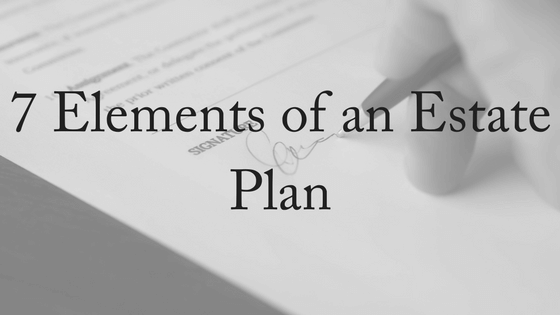What are the fundamental elements of an estate plan?
When it comes to planning your estate, it’s common to believe that you only need to write a will, and that a will is a simple document listing your assets and who you want to receive those assets when you die. Right? Estate planning is much more than a will, and even the will itself is often a complex document. Estate planning could involve creating wills, creating trusts and funds, talking to solicitors and ensuring you have covered every part of your assets. There are 7 fundamental elements of an estate plan that everyone should consider – especially as with rising house prices and superannuation funds most Australians will have significant assets in their old age.
7 Fundamental Elements of an Estate Plan
1/ Who will you choose as your executor?
This is the person who will administer your estate and follow the instructions of the will. This person should be trustworthy and able to fulfill the duties required of an executor. An executor who fails to act in the best interests of the estate can be held personally liable and removed as executor by the court. Being an executor can include a range of duties that not everyone can fill. Examples include large amounts of paperwork and paying all of the estate’s bills.
2/ Protecting your children from a previous marriage.
As blended families become increasingly common, an important consideration is to protect your children from previous relationships. In the event that you pass away before your current spouse/partner, that person is not under any obligation to provide for your children. Therefore this should be factored into your planning. You may wish that your children be taken care of by your past partner, however, if that is not the case, you should state otherwise in your parenting plan and will. It’s never a good idea to make assumptions about who will care for your children. If your family members can’t agree, the court may have to decide who will care for your children, and it may be a person you wouldn’t have wanted. Make sure you make your wishes clear.
3/ Protecting assets from lawsuits, divorce and bankruptcy.
It can be disconcerting to think that the assets you’ve spent a lifetime accumulating can be decimated by your heirs being sued, divorced or facing bankruptcy. But it is possible to protect your assets from these scenarios with the correct structuring. Ensure you discuss with a specialist in wills and estates on how to avoid those scenarios.
4/ Create oversight for children/grandchildren who many too young or inexperienced to manage an inheritance.
If you are worried that significant assets being passed to heirs that may not know how to manage it responsibly, you can add oversight into your estate plan to help them. You can also do this in the use of trusts by engaging a trustee to follow certain procedures. Examples of such oversight includes only allowing the money to be spent on your child’s college fund or giving them the money once they turn 18. This is also an important element to discuss with your lawyer.
5/ Avoid paying unnecessary tax.
Good structuring can help avoid paying more tax than is necessary. You will be surprised as to how you can structure your estate plan so that the tax paid by your beneficiaries is minimised.
 6/ Provide for heirs with special needs.
6/ Provide for heirs with special needs.
It is possible to provide for children or grandchildren with special needs, such as disability. You may be concerned about their future care once you have passed away, for example. It’s possible to specifically provide for this situation. Ensure you have outlined in your will your intentions and how you wish for care to be carried out. It may also be necessary to provide a large share of your estate to ensure that this child is cared for once you pass away. If you do so, make sure you communicate what you’ve done and why to your family to avoid misunderstanding.
7/ Discourage challenges to your estate.
Even the most carefully drafted will may be challenged in court by your heirs. But it’s possible to prevent this as much as is possible. The best way to do this is to see a specialist in wills and estates, who understands the law and can help you draft documents that are fair and reasonable while taking all your wishes into account.
Have you included all of these fundamental elements of an estate plan?
It’s not always possible to provide for every what-if scenario that might occur in the future, but it is possible to preempt many of them with good advice and careful planning. Our clients walk out of our office with a weight taken off their shoulders because they’ve taken care of their loved ones should the worst happen. If you would like to experience the same, call us today! We offer a FREE, 10-minute phone consultation.

